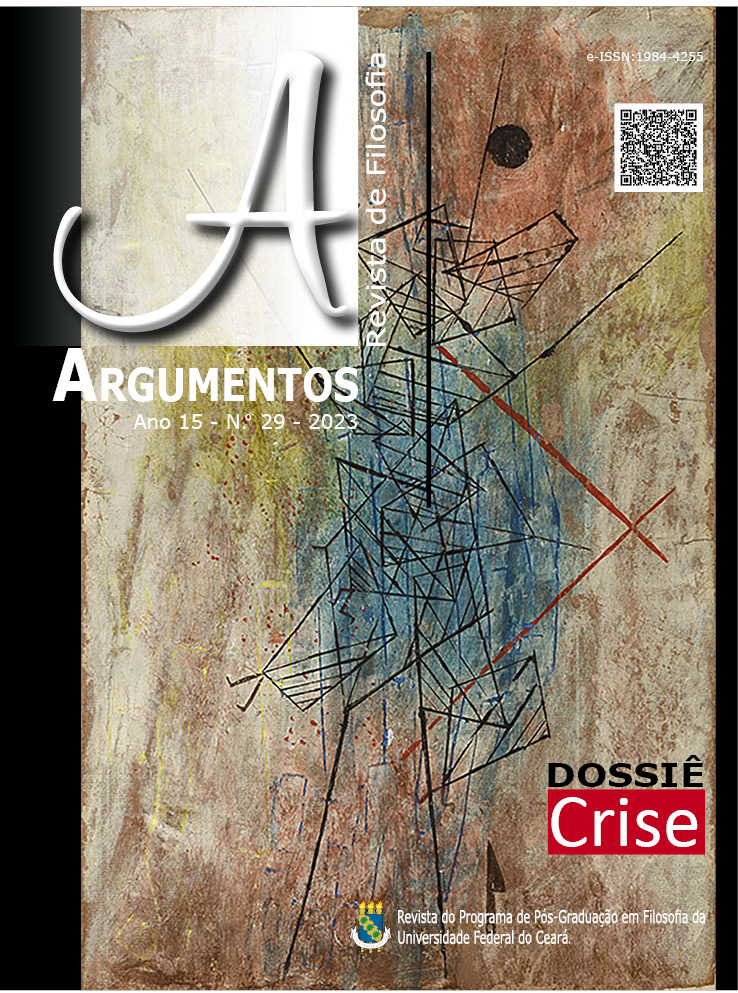Odor, flames and smoke: Covid and the incendiary crisis of reason
DOI:
https://doi.org/10.36517/Argumentos.29.4Keywords:
Covid. Crisis. Reason. Polis. Phenomenology.Abstract
The text starts from a phenomenological diagnosis: that every pandemic emergency (such as that of covid, for example) is the fatal symptom of a state of crisis motivated in the same ontological entrails of rationality as it takes shape in our Western culture. The task of thought is not to destroy reason, but to safeguard it in the face of the ever-imminent danger of irrationalism. Thus, every form of obscurantism emerges as a decadent figure with a symptomatic backdrop to the crisis of reason itself; crisis that was installed by the distinction of principle between culture and nature so well prefigured by Marx and deepened by Merleau-Ponty. The text examines this neuralgic point and ends by highlighting the essential character and therefore political inalienably this phenomenon.
References
AUSTIN, J. L. Quando dizer é fazer: palavras e ação. Tradução de Danilo Marcondes de Souza Filho. Porto Alegre: Artes Médicas, 1990.
CAMUS, A. A peste. Tradução de Valerie Rumjanek. Rio de Janeiro: BeslBolso, 2008.
CAMUS, A. Discours de reception du Prix Nobel de littérature in Stockholm, 10 décembre 1957. Disponível em: https://www.youtube.com/watch?v=uOdp7zxaPeQ.
CANGUILHEM, G. O normal e o patológico. Tradução de Maria Thereza Redig de Carvalho Barrocas. 6ª ed. Rio de Janeiro: Forense Universitária, 2009.
DIWAN, P. Raça humana: uma história da eugenia no Brasil e no mundo. São Paulo: Contexto, 2007.
EINSTEIN, A. Einstein por ele mesmo. In: SIMÕES JÚNIOR, J. G. O pensamento vivo de Einstein. São Paulo: Tecnoprint/Martin Claret, 1986.
EINSTEIN, A. Escritos da maturidade. Tradução de Maria Luiza X. de A. Borges. 2ª ed. Rio de Janeiro: Nova Fronteira, 1994.
GHIRALDELLI JÚNIOR, P. Bozo: a fusão entre o homem e o vírus. Youtube, 30 de março de 2020. Disponível em: https://www.youtube.com/watch?v=RChewZxlwyc.
HUSSERL, E. La crise des sciences européennes et la phénoménologie transcendantale. Tradução e prefácio de Gérard Granel. Paris: Gallimard, 1976.
JAPIASSU, H. O mito da neutralidade científica. 2ª ed. Rio de Janeiro: Imago, 1981.
JINPING, X. Presidente da China diz a diretor da OMS que coronavírus é um “demônio”. Uol, 28, 01, 2020, Acesso em: https://noticias.uol.com.br/internacional/ultimas-noticias/2020/01/28/presidente-da-china-diz-a-diretor-da-oms-que-coronavirus-e-um-demonio.htm.
MACEDO, E. Edir Macedo atribui pandemia a ‘Satanás’ e fala em ‘interesses econômicos’. 15.mar.2020. Acesso em: https://veja.abril.com.br/religiao/edir-macedo-dissemina-informacoes-falsas-e-atribui-coronavirus-a-satanás/
MARCEL, G. Les hommes contre l’humain. Préface de Paul Ricœur. Paris: Editions Universitaires, 1991.
MARX, K. Économie politique et philosophie. In: Œuvres philosophiques (vol. 6). Tradução de J. Molitor. Paris: Costes, 1937.
MARX, K.; ENGELS, F. Opere di Marx ed Engels: 1835-1843, v. I. Roma: Riunite, 1980.
MERLEAU-PONTY, M. Causeries (1948). Paris: Seuil, 2002.
MERLEAU-PONTY, M. Éloge de la philosophie. Paris: Gallimard, 1953.
MERLEAU-PONTY, M. Le visible et l’invisible. Paris: Gallimard, 1964.
MERLEAU-PONTY, M. Phénoménologie de la perception. Paris: Gallimard, 1945.
MERLEAU-PONTY, M. Psychologie et pédagogie de l’enfant: Cours de Sorbonne (1949-1952). Paris: Verdier, 2001.
MERLEAU-PONTY, M. Signes. Paris: Gallimard, 1960.
NICOLELIS, M. Entrevista com neurocientista Miguel Nicolelis. Brasil de Fato. São Paulo, 13 de abril de 2020. Disponível em: https://www.brasildefato.com.br/2020/04/13/jornal-brasil-atual-edicao-da-tarde-13-de-abril-de-2020.
PRADO JÚNIOR, B. Erro, ilusão e loucura: ensaios. São Paulo: Editora 34, 2004.
SHAKESPEARE, W. The merchant of Venice. New Haven and London: Yale University Press, 2006.
SILVA, C. A. F. Manipular ou habitar? Merleau-Ponty e o paradoxo da ciência. Filosofia Unisinos, v. 14, p. 84-99, 2013.
Downloads
Published
Issue
Section
License
Argumentos magazine is licensed under an International Creative Commons Attribution License.
The Magazine uses CC BY inclusion
1) The authors retain the copyright granted to the magazine or the right to initial publication, with the work regularly licensed under the Creative Commons Attribution, which allows the sharing of the work with acknowledgment of authorship and initial publication in this magazine.
2) The authors are authorized to contract additional applicable contracts, for non-exclusive distribution of the version of the work published in this journal (for example, publication in the institutional repository or as a chapter of the book), recognition of authorship and initial publication in this journal.
3) Authors are authorized and encourage to publish and distribute their work online (for example, in institutional repositories or on their personal pages) at any time before or during the editorial process, as they can generate productive changes, as well as increase the impact and reference of published work.




.jpg)










._._3.png)
1.jpg)
._._._.png)
